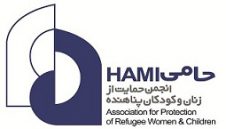About us and the history of the hami
HAMI started out as a volunteer and independent organization during the Balkan crisis in 1992 to provide help for vulnerable women and children suffering from persecution and abuse in Bosnia and Herzegovina. Later on, while the number of Afghan and Iraqi refugees were on rapid growth (4 million forced migrants) in Iran, HAMI formally established in 1999 to support women and children as the most vulnerable group in forced migrations who scattered in the disadvantaged areas of the main cities and were in desperate need of protection.
In line with our goals to provide protection and support for affected and disadvantaged Afghan women, and following the fall of the Taliban in 2002, HAMI opened its office in Afghanistan to support Afghan women in gaining their fundamental human rights.
HAMI granted special consultative status at ECOSOC in 2013.
How does the organization involve the affected communitis :
Attracting and increasing the participation of target groups in supporting programs and activities through:
1- Needs assessment of the target groups in the form of obtaining their advisory opinions individually and in small groups
2- Holding Focused Group Discussion (FGD) sessions
3- Taking advantage of the human capacities of the target group in planning, training and implementing activities
4- Identifying and attracting the participation and support of reference persons and influential groups among the refugee community
We in HAMI are in contacting with various organization of government bodies, Public organization such as municipality, National and local NGOs, Privet sectors and International organization to coordinate and implement of our programs and projects. These coordination’s include obtaining permission to carry out activities, periodic reporting or clarifying the participation of organizations for the development of activities and more support for vulnerable groups and also to advocate for change policies or public attitudes.
The Code of Conducts
Association for Supporting Refugee Women and Children, HAMI
The Association for Protection of Refugee Women and Children, HAMI, is a non-governmental, non-political, and non-profit organization committed to working towards sustainable peace and protect women, children, and other vulnerable groups affected by wars, armed conflicts, and natural disasters. It strives to provide the necessary cultural and social frameworks and support to improve the situation of those affected.
HAMI is committed to complying with national laws and regulations as well as respecting human rights, dignity, and high human values in a friendly manner. As a non-governmental organization and civil society activist, HAMI is committed to help vulnerable refugee and asylum-seeking communities, forced migrants, victims of natural disasters, and other vulnerable groups without any political bias or action, organizing all its activities within a human, ethical, and legal framework.
HAMI recognizes individual and social capacity-building as a process through which individuals, groups, organizations, institutions, and communities enhance their abilities to solve problems, achieve goals, and promote sustainable development.
Humanitarian Responsibilities:
Humanitarian actions include activities and measures aimed for preventing and reducing human suffering caused by conflicts, crises, and disasters.
Behavioral Principles:
HAMI is a non-profit, and non-governmental organization. Our focus is on vulnerable groups of forced migrants, refugees and the host communities.
Loyalty, responsibility, and trust are our primary responsibilities towards those we serve, which are fundamental principles of ours.
Participation and non-discrimination:
Our belief in maximizing the participation of women, men, youth, and children in our target communities by planning, implementing plans, and evaluating successful project execution is to ensure the participation of target groups in the communities where we work.
Respect for local values:
We respect the identity and cultural backgrounds of individuals and recognize the knowledge, culture, religious believes, and values of the host community and refugees. This does not mean that we support actions that undermine the human rights of any individual or group.
HAMI is committed to its services and activities in order to have a positive and sustainable impact.
Environmental Impacts:
HAMI has a responsible and accountable approach to care for the environment and managing rightful environmental systems in all its activities.
Monitoring and Evaluation:
We monitor and evaluate the impact of our programs and share our findings with relevant stakeholders, including the communities we serve, donors, government, and the public.
Accountability:
We are transparent and accountable in our interactions with government, community partners, people, donors, and other stakeholders. We establish financial policies and auditing systems for managing our accounts.
Transparency:
We share information about our goals and activities with our partners and take advantage of all available opportunities to communicate about our actions and programs. HAMI has a written charter that clearly outlines its mission, objectives, and organizational structures.
